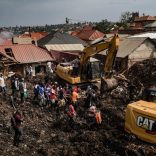Nigeria's Trans Niger oil pipeline bursts, spills crude, rights group says
Africa growth at 7-year high, no thanks to its major economies

Growth in Africa’s two largest economies may be sputtering along but that won’t stop the continent’s gross domestic product from expanding at the fastest pace since at least 2012.
GDP growth for the continent is forecast to accelerate to 4% this year, up from an estimated 3.5% in 2018, making it the fastest-growing region in the world after Asia, according to the African Development Bank.
And that’s despite Nigeria and South Africa, which make up almost half of the continent’s GDP, “pulling down Africa’s average growth,” as the Abidjan-based lender said in its latest economic outlook report.
Big players lagging
Africa’s two biggest economies are among the slowest-growing on the continent

Nigeria’s GDP will expand by 2.3% in 2019, which is below the rate of population growth, as the government struggles to reduce the nation’s oil dependence and attract foreign investment. South Africa’s expansion will be even slower, at 1.7%, as the continent’s most-industrialised economy battles to recover from last year’s recession. Both countries are in the AfDB’s list of 10 slowest-growing economies.
Surging ahead
Economic growth in East Africa will continue outpace the rest of the continent

While the powerhouses in western and southern Africa struggle to gain meaningful momentum, the continent’s economic growth will once again be driven by East Africa, which will be the fastest-expanding region for the fifth straight year.
Ethiopia, Kenya, Rwanda and Tanzania all feature on the AfDB’s list of 10 fastest-growing economies for 2019. Egypt, the biggest economy after Nigeria and South Africa, will also help drive growth. Output in the Arab world’s most-populous country will rise around 5.5% this year as the government’s structural reforms attract more investment.
Subdued growth in southern Africa is due to South Africa’s weak output, which affects neighbouring countries, the AfDB said. While West Africa’s prospects are more upbeat, they may be clouded by risks including uncertainty in global commodity prices and security concerns in some countries, the lender said.
By Prinesha Naidoo, Paul Wallace and Ruth Olurounbi












Leave a Reply
Be the First to Comment!
You must be logged in to post a comment.
You must be logged in to post a comment.